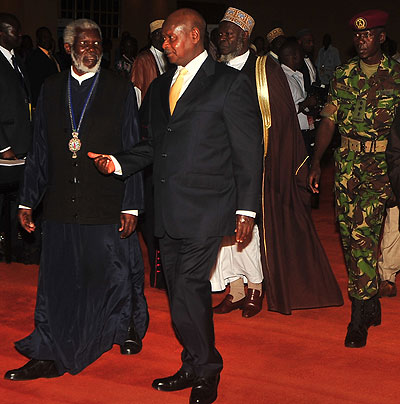Religious leaders across the African continent have called on the political elite to refocus their strategies if sustainable development is to be realised.


Religious leaders across the African continent have called on the political elite to refocus their strategies if sustainable development is to be realised.
The clergy made the remarks yesterday during the opening of a two-day African Faith Leaders’ summit on post-2015 development agenda in Kampala, Uganda.
The post 2015 development agenda will replace Millenium Development Goals (MDGs) that will expire in 2015.
At the conference, Rwanda is represented by Bishop Alexis Bilindabagabo, the Bishop of Gahini Diocese and Chairman of the Protestant Council of churches in Rwanda.
While opening the summit, Ugandan President Yoweri Kaguta Museveni, warned against donor aid, saying that the African continent is too rich and should instead be the one to offer aid to the Western world.
"Even the Bible speaks against aid. Africa doesn’t need aid. What we need is to wake up and utilise the abundant resources we have,” he told hundreds of clerics at the level of Cardinals, Archbishops, Grand Muftis, among others.
The summit is running under the theme; "Enhancing Faith Communities’ Engagement on the Post 2015 Development Agenda in the Context of the Rising Africa.”
Bilindabagabo called for stronger partnership between African governments and faith leaders.
He urged African countries to seek solutions to problems facing the continent and emphasised the need for the continent to own its development agenda.
"Development is no respector of religions and in Rwanda, we have clearly demonstrated that when religions work closely with government, a lot can be achieved,” he said.
Dr Joseph Serwadda, the Presiding Apostle of the Born Again Faith in Uganda, said MDGs are failing in Africa because some leaders think it’s a foreign initiative.
"Some leaders look at it as a tool used by the western world to put pressure on them,” he said.
David Onuoha, the Bishop of Okigwe in Nigeria, said religious leaders in Africa haven’t played their role of "calling African political leaders to order.”
"We must come out with suggestions on what should be done. We are talking of Sustainable Development Goals (SDGs) after 2015 yet Africa is still lagging behind on MDGs,” he said.
The MDGs that include; eradication of poverty, achieving of Universal Primary Education, promotion of gender equality and empowering of women, reduction of child mortality, improvement of maternal health, combating of HIV/Aids, malaria and other diseases, ensuring environmental sustainability and developing a global partnership for development, have been remarkably successful in focusing attention and mobilising resources to address the major gaps in human development.
However, of the eight goals, it is believed that only three will be fully met by 2015, thus the need for a successive agenda to build on the achievements registered since 2000 when MDGs came into place.


